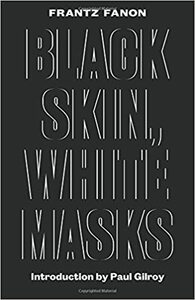You need to sign in or sign up before continuing.
Take a photo of a barcode or cover
Still a very relevant and necessary text, though it deserves some of the critiques feminists have written since it's conception. [b:Frantz Fanon: Conflicts and Feminisms|151549|Frantz Fanon Conflicts and Feminisms|T. Denean Sharpley-Whiting|https://i.gr-assets.com/images/S/compressed.photo.goodreads.com/books/1348526924l/151549._SY75_.jpg|146270] makes an interesting companion text.
challenging
informative
reflective
slow-paced
This book walks the line between an academic study of colonialism's effects on the mind and a personal account of those same effects. The personal touch of Fanon to the subject matter enhances it all the more, as if it were not already strengthened by his academic approach. I did feel the book relied perhaps too heavily on external sources, particularly Sartre, which affected its ability to stand on its own, and some aspects felt rather unnecessary to communicate Fanon's analysis. Nevertheless, this 1952 work is an excellent and thorough analysis of the mental brutality of colonialism.
Graphic: Body shaming, Racial slurs, Racism, Xenophobia, Colonisation
Moderate: Emotional abuse, Panic attacks/disorders, Slavery, Suicide
Ce n'est pas très vulgarisé et ça relève de la psychanalyse
challenging
hopeful
informative
reflective
slow-paced
3.5 stars? There are problems with this book that I'm not necessarily smart enough to understand, but I find something deeply, deeply compelling about the way Fanon is able to afford deep compassion to racist people without deigning to forgive them their wrongdoing.
Lecture difficile, dans lequel le propos alterne entre très scientifique et plutôt poétique. Résultat : je ne suis pas sûre d'avoir toujours compris. Les passages que j'ai compris étaient intéressants mais j'espérais que ça se fluidifierait au fil de la lecture.
I was very drawn to chapter six ‘the Black Man and Psychopathology’, thinking about how his argument could also tie to the desexualisation of Asian men, as well as in turn the dehumanisation. In this chapter Fanon presents how black men are hyper-sexualised (‘a penis symbol’) whilst being seen as barbaric animals. Spectacularised images of black men’s genitals are used for white men’s sexual revenge; Asian men, then, it’s an image rendered without. It’s a body without reproductive organs; Asian men is a castrated symbol, caricatural. Fanon also mentions the racialist biases in children’s book: n-word-phobia essentially lies in the grand collective consciousness of the western psyche. Not that surprising to be fair, the sun never sets, for instance, was exactly built upon a jingoistic western psyche.
Absolutely brilliant. Aspire to write like Fanon, incorporating literature, history and science so on, fusing them with each other.
Absolutely brilliant. Aspire to write like Fanon, incorporating literature, history and science so on, fusing them with each other.
challenging
informative
reflective
slow-paced
challenging
informative
fast-paced
A significant effort to explain the psychological implications of colonialism and racialized societies. Despite being a relatively short book it is still longer than it needs to be to make its point. Fanon is not a concise writer and a few chapters read more like a Nietschze type text, as in, the author takes a turn towards the poetic and philosophical that makes the specific point at issue a bit more obscure than would otherwise be the case.



